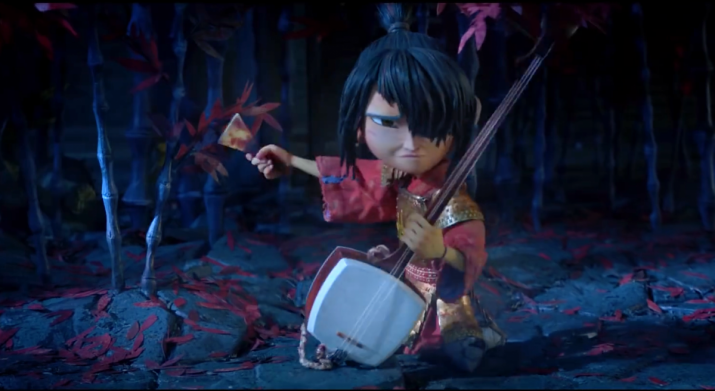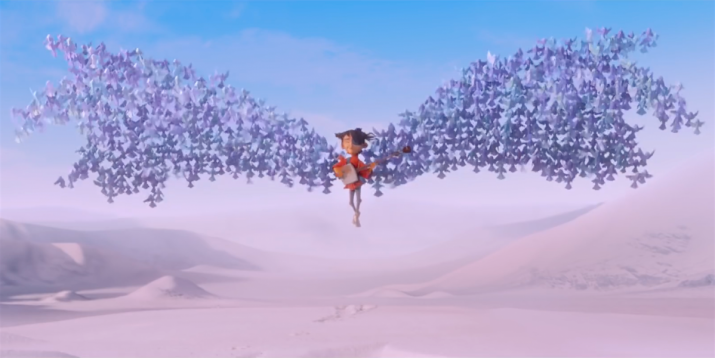NEWS
New Animated Epic Brings Buddhist Concepts to the Big Screen
 From youtube.com
From youtube.comThe enchanting new stop-motion fantasy-action-comedy feature Kubo and the Two Strings, which was released in theaters earlier this month, is an engaging parable of learning about life, with a distinctly Buddhist flavor. Ostensibly geared towards children, Kubo and the Two Strings is just as likely to entertain and inform adult viewers as it broaches the weighty themes of bereavement, loss, change, broken families, and human identity, with references to Japanese folklore, death, and reincarnation.
Set in Edo-period Japan (1603–1868), the film follows the adventures of the young protagonist Kubo (voiced by Art Parkinson) as he undertakes a harrowing supernatural quest to retrieve a magical set of armor that can help him defend his home from the evil Moon King (Ralph Fiennes). The film uses this this somewhat traditional plot structure as a vehicle to take the audience on a deeper, more poignant coming-of-age journey. Armed with a magical shamisen (a three-stringed Japanese folk instrument) and accompanied by a pair of trusty allies, Monkey (Charlize Theron) and Beetle (Matthew McConaughey), the mystical fairytale introduces the 12-year-old Kubo to some of the harsher realities of life in the real world including love, loss, connection, and personal transformation.
While not a Buddhist tale per se, the story is interwoven with Buddhist threads and references, such as when the Buddhist villagers whom Kubo entertains with his stories and shamisen light paper lanterns at the graves of their ancestors before setting them adrift on a river to guide their souls to the Pure Land. Combining accessible Western elements with a more Buddhist perspective on life, death, and the afterlife, the narrative offers powerful metaphors for the fundamental cycles of life, suffering, and mortality.
 From youtube.com
From youtube.comGeorge Takei, who voices a small but pivotal character, directly addresses one of the more obvious Buddhist-inspired moments in the film's depiction of the Japanese Obon festival. “Death is that big transition when we become one with the universe,” he says. “For young people seeing this movie, we personify it as respect for our ancestors and it becomes a celebration as well, a ritual. . . . In fact, when I was a kid I thought Obon was essentially a dancing festival and later on my parents explained to me that it was how we paid respect to our family history.” (Nichi Bei)
“That kind of spirituality is not something you typically see in film,” says American animator Travis Knight, who makes his directorial debut with this epic fable. “I think it spoke to the basic idea about losing something that matters to you, which is a fundamental part of life. You don’t get through life unscathed.” (Metro)
Knight, who notes that his mother-in-law and her family are Buddhists, adds, “Being able to explore those ideas through the prism of fantasy and animation really allows parents and children to experience those things together, in a way they can understand. Sometimes these ideas are difficult to articulate, but in a film, if done in a poetic way, those things can make sense and you can talk about them.” (Metro)
“This film is about that time in life when those relationships begin to shift and then ultimately, irrevocably begin to change. What happens in the process and how we can reconcile that,” observes the director and producer, revealing that Kubo’s story also draws inspiration from Knight’s relationship with his own mother. “Fundamentally, the film is about loss and healing, about compassion and forgiveness, and about how loving someone deeply opens us up and exposes us, but also heals us and gives us strength, and gives our lives meaning.” (Nichi Bei)
See more
KUBO AND THE TWO STRINGS INTRODUCES WESTERN KIDS TO BUDDHIST CONCEPTS (World Religion News)
Talking 'Kubo and the Two Strings' and the importance of mothers (Metro)
Kubo and the Two Strings (Slant)
‘Kubo’ delivers an animated love letter to Japanese culture (Nichi Bei)
New animated film “Kubo and the Two Strings” introduces kids to Buddhist concepts (Lion’s Roar)
Kubo and the Two Strings (official website)
Related
Buddhistdoor View: Buddhist Dimensions of Inside Out (Buddhistdoor Global)
Dharma Screenings: Buddhist Film and Pop Culture—Bringing Buddhism to Creative Media (Buddhistdoor Global)
Dharma Screenings: Buddhist Film and Pop Culture—Buddhist Traditions on the Silver Screen (Buddhistdoor Global)
Dharma Screenings: Buddhist Film and Pop Culture—Buddha 2: A Flawed Production with Compelling Characters (Buddhistdoor Global)














